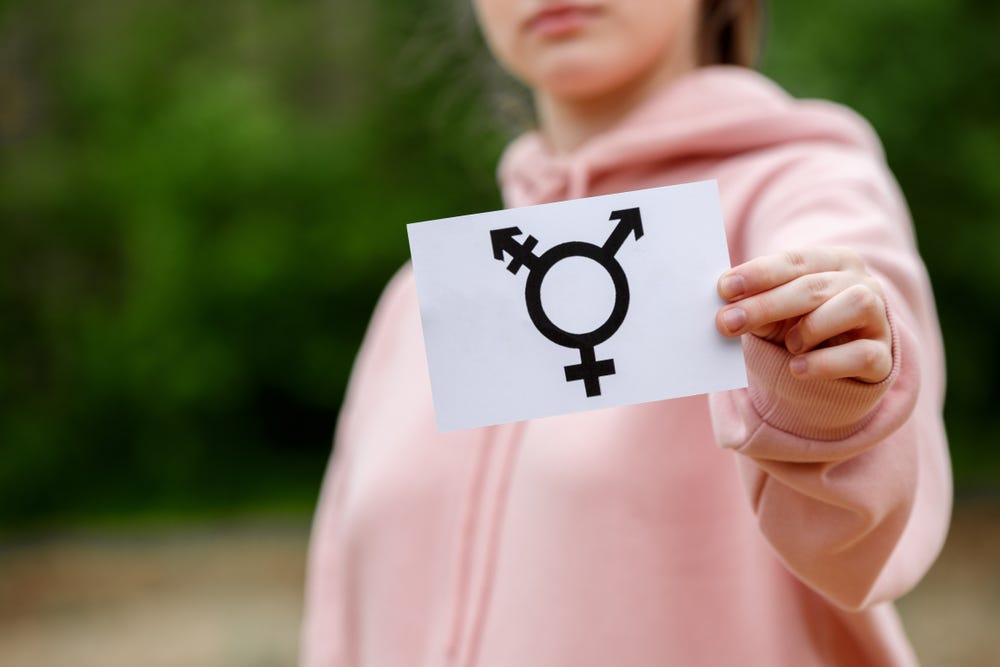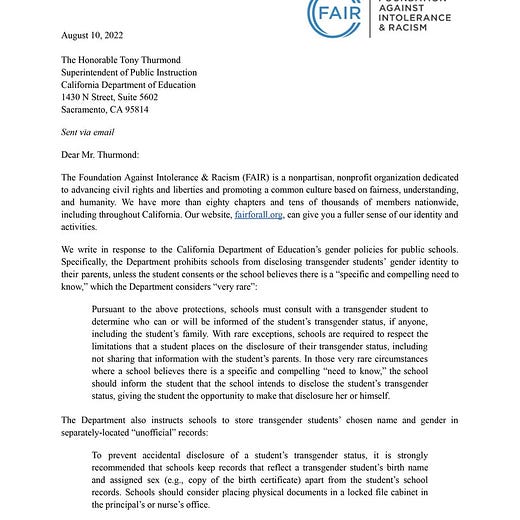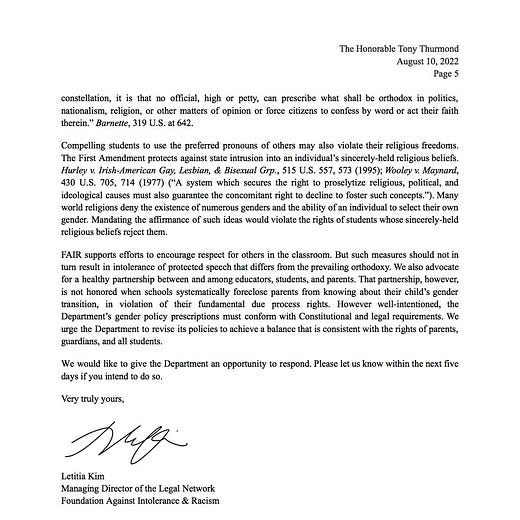E-Pluribus | August 23, 2022
Huckleberry Finn lands a professor in hot water; gender-affirmation gets some more pushback; and the medium may not be the message, but it's not nothing.
A round-up of the latest and best writing and musings on the rise of illiberalism in the public discourse:
Christopher Nadon: Censorship at a Top College for Free Speech
In his attempt to illustrate to a student that censorship indeed exists in the United States, a professor at Claremont McKenna college succeeded even more than he intended. Writing for The Wall Street Journal, Christopher Nadon relates his experience following his quoting a classic American novel, Huckleberry Finn.
On Oct. 4, 2021, my class discussed Plato’s “Republic” and his views about censorship. A student objected that Plato was mistaken about its necessity. Here in the U.S., she said, there is none. Someone brought up “Huckleberry Finn.” She replied, correctly, that removing a book from curriculums doesn’t constitute censorship. I pointed out that the case was more complicated. The book had also been removed from libraries and published in expurgated editions.
An international student asked me why. I told her, quoting Mark Twain’s precise language, which meant speaking the N-word. This caused the first student to change her mind and acknowledge the existence of censorship in America. Far from being harmed by hearing the word, she now saw that Plato’s views couldn’t be dismissed as outdated and merited more serious consideration. This liberation from her initial prejudice bore fruit. Later in the semester she raised a very thoughtful question about Socrates’ criticisms of the poets: “But isn’t Plato a poet?” A rare success.
CMC’s administration determined to put an end to any such successes. The associate dean of faculty, Ellen Rentz, emailed me on Oct. 14 asking me to speak on the phone about “some serious concerns” a student had raised with her about one of my courses. I asked repeatedly for her first to communicate the concerns in writing over email, but Ms. Rentz wanted only to discuss them in person, over the phone, or on Zoom. Eventually, on Nov. 6, the Dean of Faculty Heather Antecol emailed me explaining the student’s concerns, who it turned out was not filing any sort of official complaint. After saying “this is not a disciplinary matter,” Ms. Antecol said CMC still had a “duty to appropriately respond to concerns brought to the College’s attention” and demanded to know the “pedagogic principles” that I thought justified using “the n* word expressly.”
[ . . . ]
The effects of the administration’s actions are disastrous and lasting. Students, already fearful to speak their minds, become even more so when they see that certain peers can veto the content of courses and conduct of teachers arbitrarily. Professors, a generally timid lot at best, give increased devotion to the cause of conformism. The liberating power of books, particularly those written in times and places distant from ours, is diminished when they are expurgated and bowdlerized.
Read the whole thing.
Stella O’Malley: At the American Academy of Pediatrics, ‘Affirmation’-Based Gender Dogma Is Finally Being Challenged
We noted at the beginning of this month that cracks were beginning to appear in the gender-affirming approach of health professionals in the treatment of children in particular. Stella O’Malley writes for Quillette that there are signs that the rank and file membership of the American Academy of Pediatrics is notably less enthusiastic about the approach than the organization may wish to admit.
While the AAP’s leadership has tried to present its members as unified, or nearly unified, in their embrace of the gender-affirmative approach, the truth is that different schools of thought have emerged in recent years. One of these is the so-called gender-exploratory approach, used by therapists who seek to promote a more holistic view of the individual. Many of these therapists have come together through the Gender Exploratory Therapy Association (GETA), of which I am a co-founder. We seek to provide families with access to therapists who offer a process that doesn’t push transition on people who are exploring their gender identity or struggling with their biological sex.
[ . . . ]
Within the AAP itself, dissent is now more openly expressed. In an August 10th post on the AAP web site, the group’s president, Moira Szilagyi, claimed that an anti-affirmation resolution raised at this year’s leadership conference had been stymied because its supporters hadn’t been able to meet the requirements of “standard parliamentary procedures.” But those AAP “procedures” had been altered this year in a way that limited members’ abilities to comment on “unsponsored” resolutions such as this one—i.e., resolutions advanced by individuals, not AAP chapters. And many AAP members suspect that the clear purpose of this procedural manoeuvre was to prevent the formal recording of a 2022 resolution—Resolution #27—requesting a systematic review of the available evidence with a view toward updating the 2018 AAP policy statement.
Earlier this month, the plot thickened, when a newspaper reported on internal AAP documents indicating a rising tide of anger and resentment among the group’s rank-and-file. As it turns out, discussion of Resolution #27 has been fierce and widespread within both informal AAP communication channels and formal committees. Indeed, the AAP apparently will be going ahead with a process of reviewing the available evidence (which would presumably include the recent UK Independent Review of Gender Identity Services for Children and Young People, which found no convincing evidence that the benefit of hormones outweigh the associated risks for those newly emergent cohorts of gender dysphoric teenagers who often have co-morbid challenges such as ASD, ADHD, and anxiety disorders). But to date, this process has been cloaked in secrecy, and some insiders have already accused the AAP of preordaining an analysis that will re-confirm the 2018-era position.
Read it all here.
Martin Gurri: The Fifth Wave: Is the Medium Really the Message?
If anyone really ever believed that the internet was going to be the answer to what ails society, that myth has long since shattered. At Discourse Magazine, Martin Gurri explores some of the introspection going on amongst writers and thinkers about how social media and other types of digital communication impact, distort or even undermine the very content and messages they are meant to make easier to convey.
Another effect of the digital medium is more indirect but may also be more profound. The moment one enters the online environment, the self begins to liquify. The lack of external or internal pressures makes it impossible to maintain a definite shape or character. On the web, you can be anyone or anything—a vertigo-inducing condition that is equivalent to being nothing. Identity, which in traditional culture was pressed hard upon us by social forces and in modernity became problematic, now dissipates into thin air. Those of us who are of a certain age will borrow attributes from the analog world. But the young make no distinction between virtual and real. They are stuck on a question that is part narcissism and part fear of the monster in the labyrinth: What am I?
Let’s be clear: This is a pathological affliction. It’s the cause of much anxiety, depression, even suicide. The youngest generation boasts of its fluidity: You can be any one of 72 genders, alter your online portrait to fit some ideal of perfection and, if the mood strikes, you can become someone else entirely, again and again. What is affirmed isn’t freedom but necessity. What is experienced isn’t discovery but confusion. The herd instinct in the young runs far deeper than the algorithms of social media. By being told which words are mandated and which are taboo, which opinions are safe and which are “harmful,” an artificial membrane is produced to hold, in a facsimile of identity, the liquid self.
It may be that the lure of populism depends to some extent on this effect. Populists like Trump and Alexandria Ocasio-Cortez are skilled actors who can project outsized, sharply defined personalities across the digital medium. Their supposed “authenticity” is really a performance—an ability to play-act boldness of character—that could be perceived as guiding stars in the darkness by those suffering the process of identity dissolution.
Read it all.
Around Twitter
Jesse Singal on information overload and the lost art of ignoring things. At this point, it’s for subscribers only, so if you’re not one, just ignore it!
The Foundation Against Intolerance & Racism (FAIR) is going to bat for parents’ rights in California:
And finally: but how do we even know what their preferred pronouns are?











